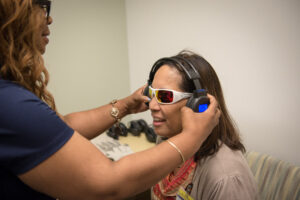When it comes to understanding dementia, knowledge is power. Whether you’re navigating the complexities of memory loss or seeking the best care for a loved one, having the right information can make all the difference. That is why today, our senior memory care in Lincoln wants to help provide you with some important information to help you stay informed. Here are 11 crucial facts about dementia that shed light on this challenging condition, as well as details about how to become a resident of our CountryHouse community:
1. Dementia is Not a Single Disease
Contrary to popular belief, dementia is not a singular condition. Instead, it’s an umbrella term used to describe a range of cognitive impairments that interfere with daily life. Alzheimer’s disease is the most common type of dementia, but there are other variants, including vascular dementia, Lewy body dementia, and frontotemporal dementia, each with its own distinct characteristics and progression. If you are concerned that yourself or a senior loved one might be exhibiting signs of dementia, it is very important that you schedule an appointment with a primary care physician to undergo assessment and testing.
2. Dementia is Different from General Forgetfulness
While occasional forgetfulness is a normal part of aging, dementia involves more than just occasional memory lapses. It encompasses a broad spectrum of cognitive decline, affecting both long and short term memory. It’s more than just forgetting where you parked at the supermarket or where you last saw your wallet.
3. Early Diagnosis is Key
Early diagnosis of dementia is crucial for several reasons. Firstly, it allows for prompt intervention and treatment to manage symptoms and slow disease progression. Secondly, it enables individuals and their families to plan for the future, make informed decisions about care options, and access support services.
4. Risk Factors for Dementia
While age is a significant risk factor for dementia, it’s not the sole determinant. Other risk factors include genetics, family history, cardiovascular health, lifestyle factors (such as diet, exercise, and social engagement), and certain medical conditions. Understanding these risk factors can help individuals take proactive steps to reduce their risk of developing dementia. If you are concerned about your risk for developing dementia, have a conversation with your doctor as soon as possible.
5. Dementia Impacts More Than Memory
While memory loss is a hallmark symptom of dementia, the condition affects various cognitive functions beyond just memory. Individuals living with dementia may experience difficulties with language, communication, reasoning, problem-solving, spatial awareness, and executive function. These cognitive changes can have profound implications for daily life and relationships.
6. Dementia Affects Individuals Differently
Dementia is not one size fits all. In fact, it is a highly individualized condition, with symptoms and progression varying from person to person. Factors such as the type of dementia, underlying health conditions, age, and overall cognitive reserve can influence how the disease manifests and progresses in each individual. This variability underscores the importance of personalized care and support.
7. Safety and Security is Vital
Dementia wandering and episodes of agitation and anxiety are key concerns for the loved ones of those living with dementia. Memory care communities prioritize safety and security to ensure the well-being of residents living with dementia. From secure living environments to trained staff members who understand the unique needs of those with cognitive impairments, memory care communities offer peace of mind for families seeking specialized care for their loved ones.
8. Meaningful Engagement is Essential
Meaningful engagement is vital for promoting well-being and quality of life for individuals living with dementia. Memory care communities offer a range of activities and programs designed to stimulate the mind, encourage socialization, and foster a sense of purpose and belonging. From art therapy and music programs to gardening and pet therapy, these activities provide opportunities for residents to connect, create, and experience joy.

9. Caregiver Support is Critical
Caring for a loved one with dementia can be emotionally and physically demanding. Memory care communities offer support not only for residents but also for their families and caregivers. From educational resources and support groups to respite care options, these communities provide valuable support and resources to help caregivers navigate the challenges of caring for someone with dementia.
10. Memory Care Residents Benefit From a Holistic Approach to Wellness
At CountryHouse, we believe in nurturing the holistic well-being of our residents. Our LifeCycles Wellness Program focuses on supporting the social, spiritual, intellectual, and physical needs of each individual in our care. From engaging activities to nutritious dining options and personalized care plans, we strive to enhance the quality of life for those living with dementia.
11. Transitioning to Memory Care Can Improve Quality of Life
Last but not least, moving to a memory care community like CountryHouse can significantly improve the quality of life for individuals living with dementia. With specialized care, engaging activities, and a supportive environment, residents can thrive and experience a renewed sense of purpose and belonging. At CountryHouse, we’re dedicated to providing compassionate, person-centered care that honors the unique needs and preferences of each individual in our community.
Additionally, memory care communities offer assistance with activities of daily living (ADLs) such as bathing, dressing, grooming, and helping residents maintain their personal hygiene and dignity. Trained staff members provide compassionate care and support, respecting residents’ independence and autonomy.
Also, memory care communities develop individualized care plans based on residents’ unique needs, preferences, and abilities. These care plans evolve as residents’ needs change, ensuring they receive the right level of support and assistance to maintain their independence and dignity.
Contact Our Senior Memory Care in Lincoln
In conclusion, dementia is a complex and challenging condition that requires specialized care and support. With the right knowledge, resources, and compassionate care, individuals living with dementia can continue to lead fulfilling and meaningful lives. If you’re seeking senior memory care in Lincoln, we invite you to contact CountryHouse to learn more about our personalized approach to memory care and schedule a tour of our community. Let us help you and your loved ones navigate the journey of dementia with dignity, respect, and compassion.




